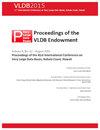SimpleTS: An Efficient and Universal Model Selection Framework for Time Series Forecasting
IF 3.3
3区 计算机科学
Q2 COMPUTER SCIENCE, INFORMATION SYSTEMS
引用次数: 0
Abstract
Time series forecasting, that predicts events through a sequence of time, has received increasing attention in past decades. The diverse range of time series forecasting models presents a challenge for selecting the most suitable model for a given dataset. As such, the Alibaba Cloud database monitoring system must address the issue of selecting an optimal forecasting model for a single time series data. While several model selection frameworks, including AutoAI-TS, have been developed to predict a dataset, their effectiveness may be limited as they may not adapt well to all types of time series, resulting in reduced prediction accuracy. Alternatively, models such as AutoForecast, which train on individual data points, may offer better adaptability but are limited by longer training time required. In this paper, we introduce SimpleTS, a versatile framework for time series forecasting that exhibits high efficiency and accuracy across all types of time series data. When performing an online prediction task, SimpleTS first classifies input time series into one type, and then efficiently selects the most suitable prediction model for this type. To optimize performance, SimpleTS (i) clusters models with similar performance to improve the efficiency of classification; (ii) uses soft labeling and weighted representation learning to achieve higher classification accuracy for different time series types. Extensive experiments on 3 private datasets and 52 public datasets show that SimpleTS outperforms the state-of-the-art toolkits in terms of both training time and prediction accuracy.SimpleTS:一种有效且通用的时间序列预测模型选择框架
时间序列预测,即通过时间序列预测事件,在过去几十年中受到越来越多的关注。时间序列预测模型的多样性对给定数据集选择最合适的模型提出了挑战。因此,阿里云数据库监测系统必须解决单个时间序列数据选择最优预测模型的问题。虽然已经开发了包括AutoAI-TS在内的几个模型选择框架来预测数据集,但它们的有效性可能受到限制,因为它们可能无法很好地适应所有类型的时间序列,从而导致预测精度降低。另外,像AutoForecast这样在单个数据点上进行训练的模型可能提供更好的适应性,但受所需训练时间较长的限制。在本文中,我们介绍了SimpleTS,这是一个用于时间序列预测的通用框架,在所有类型的时间序列数据中都表现出高效率和准确性。在执行在线预测任务时,SimpleTS首先将输入的时间序列分类为一种类型,然后高效地选择最适合该类型的预测模型。为了优化性能,SimpleTS (i)将性能相近的模型聚类,提高分类效率;(ii)利用软标记和加权表示学习对不同时间序列类型实现更高的分类精度。在3个私有数据集和52个公共数据集上进行的大量实验表明,SimpleTS在训练时间和预测精度方面都优于最先进的工具包。
本文章由计算机程序翻译,如有差异,请以英文原文为准。
求助全文
约1分钟内获得全文
求助全文
来源期刊

Proceedings of the Vldb Endowment
Computer Science-General Computer Science
CiteScore
7.70
自引率
0.00%
发文量
95
期刊介绍:
The Proceedings of the VLDB (PVLDB) welcomes original research papers on a broad range of research topics related to all aspects of data management, where systems issues play a significant role, such as data management system technology and information management infrastructures, including their very large scale of experimentation, novel architectures, and demanding applications as well as their underpinning theory. The scope of a submission for PVLDB is also described by the subject areas given below. Moreover, the scope of PVLDB is restricted to scientific areas that are covered by the combined expertise on the submission’s topic of the journal’s editorial board. Finally, the submission’s contributions should build on work already published in data management outlets, e.g., PVLDB, VLDBJ, ACM SIGMOD, IEEE ICDE, EDBT, ACM TODS, IEEE TKDE, and go beyond a syntactic citation.
 求助内容:
求助内容: 应助结果提醒方式:
应助结果提醒方式:


